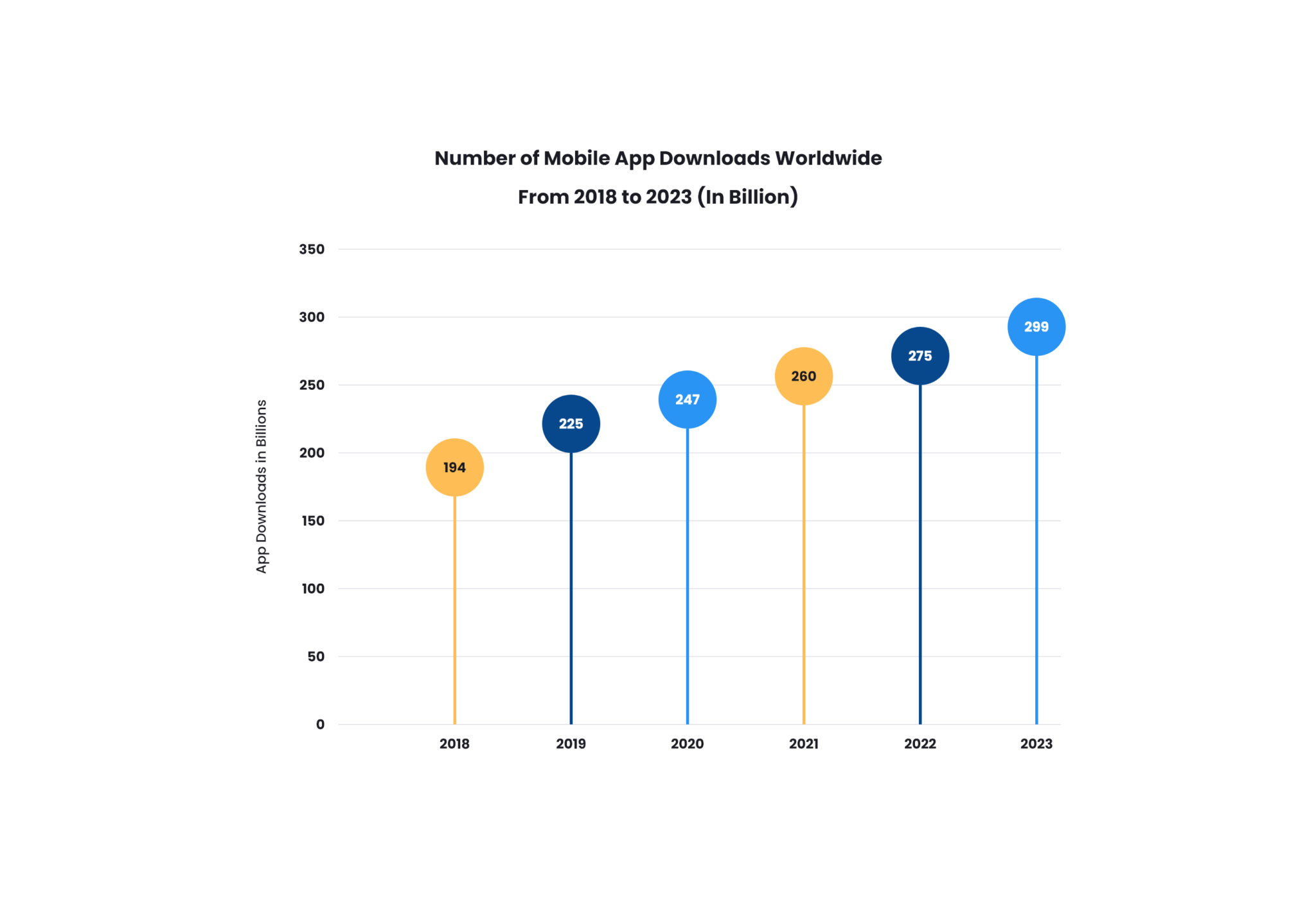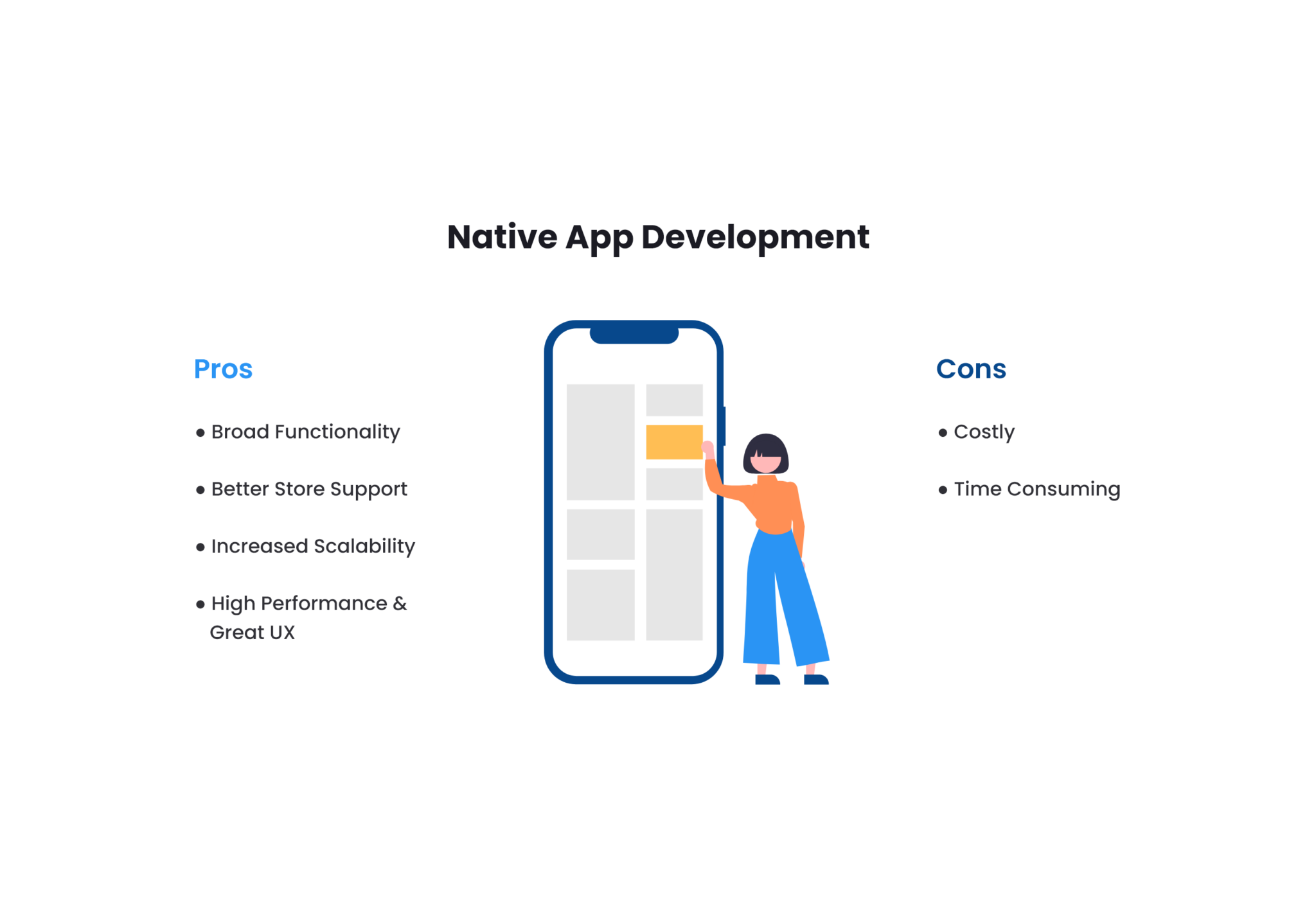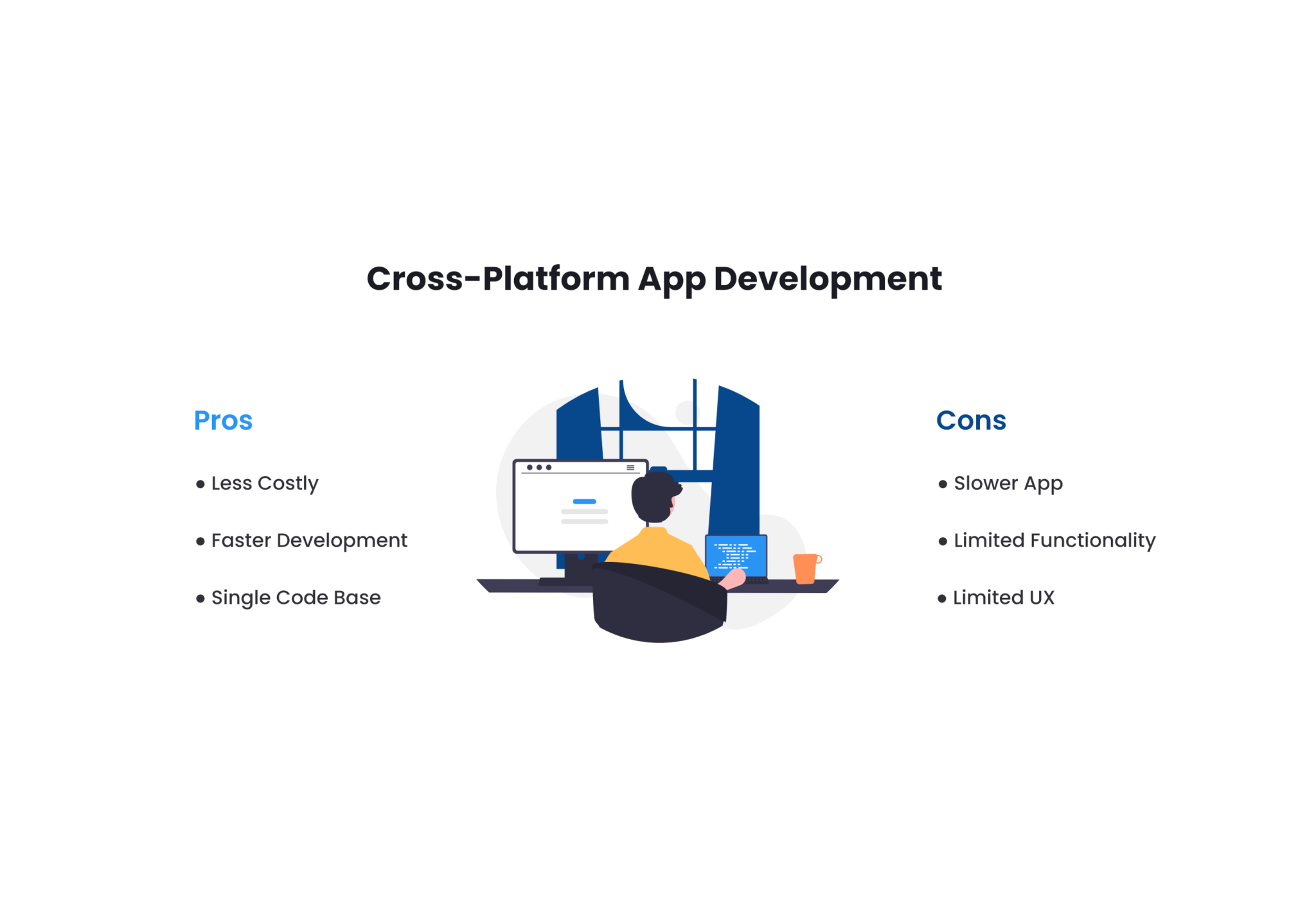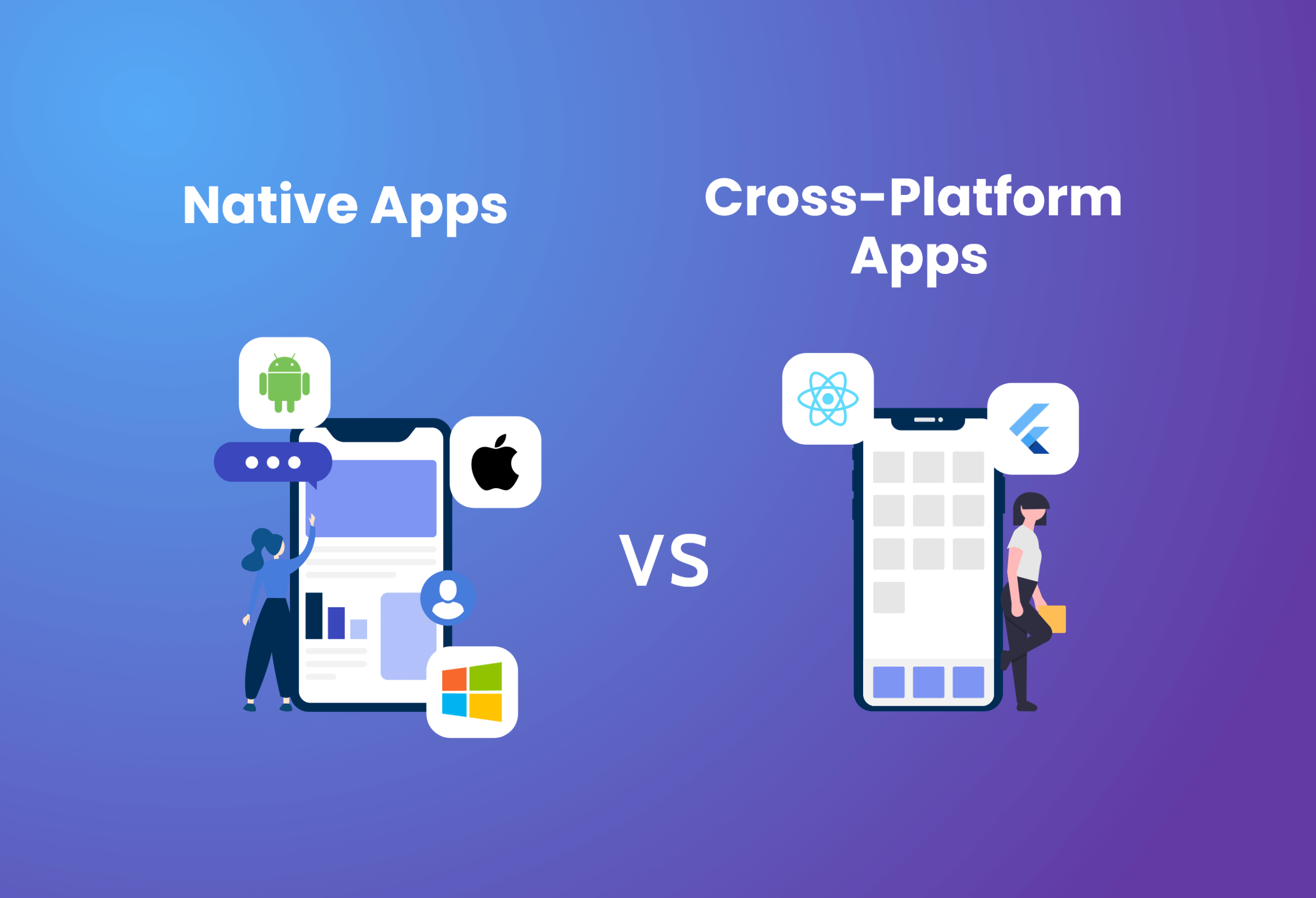In this blog post, we’ll go through the two primary techniques for app development: native VS cross-platform development. Why? Because, as a result of technological advancements, our lives have grown more reliant on digital assets. We make the most important choices in our lives and organizations via the use of the Internet and mobile applications. Businesses have a hard time competing in the digital world because there are so many apps on the Play Store and App Store and they have limited exposure, skills, resources, and funds.
It is predicted that the yearly number of app downloads globally will reach 299 billion by 2023, an increase from the expected 247 billion global app downloads in 2020. In addition, by 2023, paid downloads and in-app advertising are expected to produce over $935 billion in income for mobile applications.

Because of the competitive environment, business owners are under constant pressure to place more emphasis on the quality, precision, functionality, and other factors that encourage prospective consumers to choose their services over alternatives. And it is at this time that we must decide between native VS cross-platform development methods. Businesses often face many difficulties, including deciding on the best technology to depend on, whether to use iOS or Android, and which app development framework would be the most effective in increasing client interaction.
What to Consider When Choosing a Methodology for Developing a Mobile Application
When deciding between native VS cross-platform development, we must first understand the factors to consider when selecting a mobile application development approach:
The complexity of the application
Cross-platform development is an excellent option if all your app does is utilize network-fetched data. In contrast, if your application needs extensive processing or access to low-level APIs, you might choose native development because cross-platform tools may not be able to access them.
Cost
Native development delivers high-performance applications, yet it is time-consuming and expensive to develop. If you are working with a small budget, cross-platform development is the best option to consider. Because just a single codebase is created for an app that runs on both Android and iOS, you’ll save between 30 and 40% on development costs.
Time Required for Development
Getting an MVP app up and running as soon as possible is important in some projects. This is the point at which you should think about cross-platform development. You do not need to work on two different versions of the app. Creating an app for both Android and iOS requires just a single development cycle.
UI/UX
Native development is the way to go if you want stunning visuals and an engaging experience. When developing in a native environment, developers have access to the UI/UX components. Selecting cross-platform development may strictly limit the UI/UX elements of the program.
Native vs. Cross-Platform: What Is Native App Development?
Building a mobile app just for a single platform is referred to as “native app development.” In this case, programming languages and tools unique to a particular platform are used to create the app. For example, you can develop a native Android application using Java or Kotlin while developing iOS applications using Swift and Objective-C.
When comparing native VS cross-platform applications, native apps are renowned for providing a superior user experience because they are typically high-performing. Because the visuals are matched to the platform’s user experience, the overall user experience is seamless. On the other hand, startups are worried about the high cost of native app development. And that’s because they must simultaneously build for two platforms.
The Pros of Native Application Development
Increased Scalability
Native apps are scalable because of the resource management flexibility and the range of tools available.
High-performance and excellent user experience
The direct communication between the code and the underlying resources results in an excellent performance. Additionally, native applications often offer a superior user experience (UX) that is synonymous with the platform.
Broad Functionality
If you’re working on a platform, you’ll have access to every API and tool that it has to offer. According to the current state of technology, there are no restrictions on how programmers develop the new app.
Improved Support in Store
Generally speaking, native apps are simpler to publish, and they are often placed higher in the platform’s app store since they provide superior performance and speed.
The Cons of Native App Development
Costly
When you need to publish your app on both iOS and Android, developing native applications might be outrageously costly. Because of this, you’ll need to deploy two teams that will work on separate platforms.
Time-consuming
Because the work done on one platform cannot be repeated on another, native app development is time-consuming. Rather, a different team will be required to work on the other version.

What Is Cross-Platform App Development and How Does It Work?
Because we have already reviewed native app development in today’s subject of native VS cross-platform, let’s take a closer look at cross-platform development now.
Cross-platform development refers to developing an application that is compatible with several platforms. This is accomplished via the use of technologies such as React Native, Xamarin, and Flutter, which allow the applications built to be published on both Android and iOS devices.
While cross-platform development saves time and money, there is a danger that quality may be compromised in the process. The implementation of an app that operates ideally on several platforms is complex, as the app will need an extra abstraction layer when running. This can result in decreased performance.
Cross-platform programming is more attractive to startups since it saves time and money. Nonetheless, it would help if you were mindful of the fact that it may be more difficult to correct the app beyond what is permitted by the framework.
The Pros of Cross-Platform Application Development
Less Costly
An application that runs on several platforms will need just one development team rather than two, as in the case of a native app. As a result, you will save money on the development costs.
Faster Development
When developing an application that operates on various platforms, just a single development cycle is necessary.
Single Code Base
There is just one code base for the app since it was developed using a single cross-platform development tool.
The Cons of Cross-Platform Application Development
An app that runs more slowly
Because of the need for an extra abstraction layer and rendering process, the cross-platform application is much slower than its native equivalent.
Limited Functionality
Developers may probably have problems accessing smartphone features such as the microphone, camera, and geolocation in the same manner that a native app would.
Limited UX
Cross-platform applications are unable to make use of native user interface components. As a result, it cannot provide the same user interface experience that is familiar with the platform.

Native VS Cross-Platform: Which One to Choose?
Choose wisely, since your choice will influence how much it will cost, how long it will take to develop, and how consumers react to the application. Before making a decision, consider all of the factors listed above. If you’re still not sure which to choose between native and cross-platform, here are some additional tips:
When Should You Think About Developing a Native App?
-
- It is more likely that your target audience will be using your app for the first time, and you want to make a good first impression by providing them with the best possible app experience.
-
- It is necessary to code specifically for a single platform.
-
- You are one of the businesses interested in 3D games and animations.
-
- You want to gain many daily active users (DAUs), pursue venture capital investors for product financing, and design an app that is simple to understand yet intuitive to use.
-
- It is necessary to include device-specific features like GPS, a camera, etc.
When Should You Consider Developing a Cross-Platform Application?
-
- You have a tight budget, limited time, and limited resources, and you must develop a mobile application on many platforms.
-
- It would help target both iOS and Android app users in your marketing efforts.
-
- You need a more rapid app development process.
-
- The app isn’t complicated, and it doesn’t need any features that differ significantly across platforms.
So, you can choose between native and cross-platform based on the scenarios explained above.
Our final thoughts
As an award-winning software engineering company, we know that there are advantages and disadvantages to both native and cross-platform app development. To choose an app development platform between native VS cross-platform, it is necessary to determine the exact business criteria that must be met. Before selecting an app development platform, IT business managers must determine exactly what they want. This is why you need to think about both the short and long term when making your decision.

